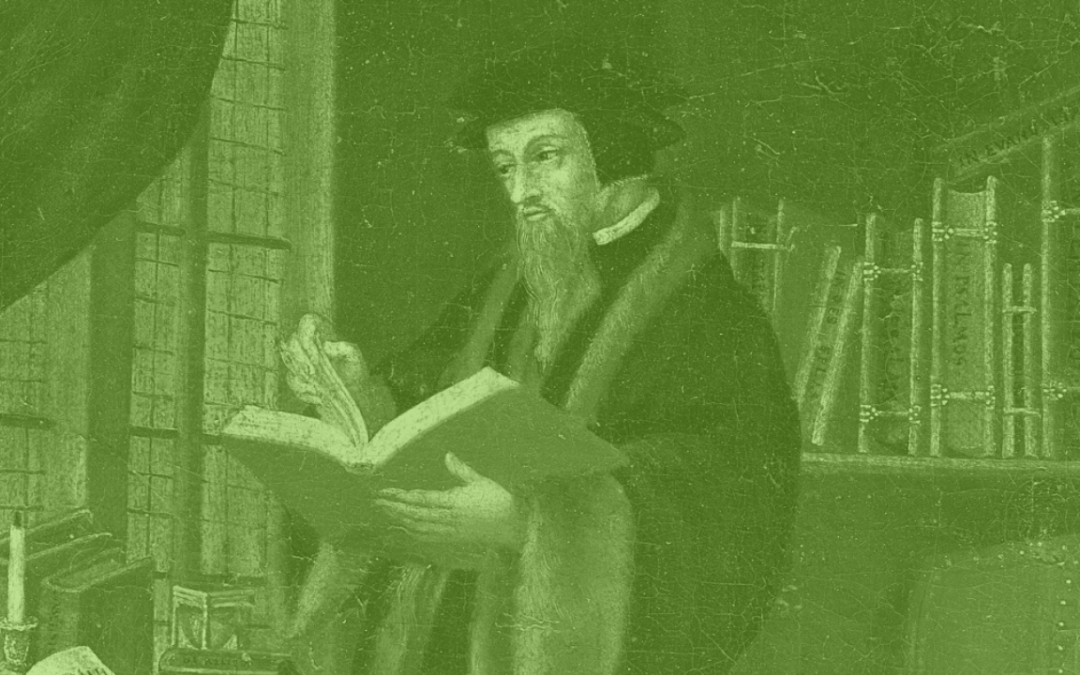
John Calvin on John 17:5
Recent discussion centered around the nature of the incarnation of the Son has driven some to investigate the interpretational tradition of John 17:5. Christology is one of the most difficult loci of Christian theology, and so we should approach it humbly, not approving of error, but also striving patiently and lovingly with our brothers when we believe they’ve misspoken.
Presently, there seems to be a great deal of difficulty accounting for the Son’s assumption of a human nature and, as a result, the things the Son does in that human nature. Case in point, Christ’s prayer for the glory He had with the Father “before the world was” in John 17:5.
The issue seems to be the prima facie grammar of that singular verse. But behind the grammar lies the theological assumptions (or lack thereof) of the language used to speak of God in Himself: self-existence, immutability, impassibility, and simplicity. It’s as if some come to texts like John 17:5 and drop all their theology proper at the door, allowing for contingency, mutability, passibility, and complexity in the Son’s divine nature.
On its face, John 17:5 seems to insinuate Christ once had a glory that He did not have as He prayed, a glory that He prayerfully demands to resume upon the fulfillment of His Father’s will. Because of the confusion arising from this particular reading of John 17:5, I thought it best to revisit the traditional way in which the sense has been understood by the likes of John Calvin. Calvin is often at variance with other commentators, so I do not take him to be the end-all. But for all of Calvin’s novelty, e.g. John 5:20, the commitment to the fundamental Christology shown below remains continuous between him and others. I will survey Calvin’s Institutes of the Christian Religion as well as his direct commentary on John 17:5, making my own comments as needed.
The Theology Behind Calvin’s Exegesis (The Institutes)
When reading a 16th century Bible commentator, like Calvin, it is important to have some grasp of the categories he was working with. For this, we need to visit his Institutes, in which he writes concerning the Person of the Son in whom, at the incarnation, two natures are united without conversion or confusion—
When it is said that the Word was made flesh, we must not understand it as if he were either changed into flesh, or confusedly intermingled with flesh, but that he made choice of the Virgin’s womb as a temple in which he might dwell. He who was the Son of God became the Son of man, not by confusion of substance, but by unity of person. For we maintain, that the divinity was so conjoined and united with the humanity, that the entire properties of each nature remain entire, and yet the two natures constitute only one Christ.[1]
Key here is the phraseology, “that the entire properties of each nature remain entire.” Though “divine prerogatives” appears to be a term increasingly utilized in postmodernity (though there are uses in the 17th century), if it is to be used it must be included within the scope of what Calvin terms “properties of… nature.” In this case, the Person of the Son would not “lay aside” any properties or prerogatives proper to the divine nature as has recently been claimed. Instead, the Son qua God would maintain those prerogatives, though such (divine) prerogatives are neither proper to nor exemplified in the Person of the Son according to His human nature. In the same place, Calvin articulates what would later be termed partitive exegesis—
They sometimes attribute to him qualities which should be referred specially to his humanity and sometimes qualities applicable peculiarly to his divinity, and sometimes qualities which embrace both natures, and do not apply specially to either.[2]
We see this parsing between divine and human natures united in the one Person elsewhere in Calvin when he writes—
Again, his being called the servant of the Father, his being said to grow in stature, and wisdom, and favour with God and man, not to seek his own glory, not to know the last day, not to speak of himself, not to do his own will, his being seen and handled, apply entirely to his humanity; since, as God, he cannot be in any respect said to grow, works always for himself, knows every thing, does all things after the counsel of his own will, and is incapable of being seen or handled.[3]
Thus, Calvin believes that what is proper to the divine nature ought to be appropriated to the Person of the Son accordingly, and likewise in terms of the human nature, while yet some things apply generically to Christ’s Person on the hypothesis of the communicatio idiomatum, e.g. the authority of Christ which is predicated of His Person. Nevertheless, creaturely traits must be referred to the creaturely nature, and divine “traits” to the divine.
John Calvin on John 17:5
Now that we have seen some of Calvin’s key assumptions, especially his partitive language, we are better equipped to observe and speak to his actual commentary on John 17:5. He begins by writing:
The glory which I had with thee. He desires to be glorified with the Father, not that the Father may glorify him secretly, without any witnesses, but that, having been received into heaven, he may give a magnificent display of his greatness and power, that every knee may bow to him. (Philippians 2:10)[4]
This is a glory to be manifest as a result of the finished work of Christ. Our Lord speaks of this glory in Luke 24:26, “Ought not the Christ to have suffered these things and to enter into His glory?” This is a “display of his greatness” according to His human nature since, according to the divine nature this glorious greatness in the Person of the Son was never diminished or laid aside whatsoever. He concludes:
Consequently, that phrase in the former clause, with the Father, is contrasted with earthly and fading glory, as Paul describes the blessed immortality of Christ, by saying that he died to sin once, but now he liveth to God. (Romans 6:10)
Thus, a heavenly glory which Christ procured according to His human nature. He goes on:
The glory which I had with thee before the world was. He now declares that he desires nothing that does not strictly belong to him, but only that he may appear in the flesh, such as he was before the creation of the world; or, to speak more plainly, that the Divine majesty, which he had always possessed, may now be illustriously displayed in the person of the Mediator, and in the human flesh with which he was clothed.
Calvin’s words here are crucial, “He now declares that he desires nothing that does not strictly belong to him…” In other words, this glory is a glory the Son always possessed and never laid aside, but prayed that He might enter into it according to His human nature at His exaltation. This exaltation was not an exaltation according to His divine nature, but according to His human nature. After all, how could the Person of the Son be exalted according to His divine nature if the divinity never underwent humiliation?
This becomes plain when Calvin says, “that the Divine majesty, which he had always possessed, may now be illustriously displayed in the person of the Mediator, and in the human flesh with which he was clothed.” This is nothing more and nothing less than a prayer for an incarnate glorification of the divine Person of the Son according to His incarnate human nature. In other words, the Person of the Son never laid aside any glory in the divine nature. According to His human nature, however, all that principally and necessarily pertains to humanity, apart from sin, must be ascribed to Him. Calvin goes on—
This is a remarkable passage, which teaches us that Christ is not a God who has been newly contrived, or who has existed only for a time; for if his glory was eternal, himself also has always been. Besides, a manifest distinction between the person of Christ and the person of the Father is here expressed; from which we infer, that he is not only the eternal God, but also that he is the eternal Word of God, begotten by the Father before all ages.
The Son, eternally God, of one essence/nature with the Father, assumed the fulness of a human nature. Features of creatureliness (not divinity) are appropriated to the human nature and not to the divine, e.g. walking, praying, ignorance, etc. Furthermore, Calvin notes the distinction between the Persons of the Father and Son, and also the manner of distinction, “he is not only the eternal God, but also that he is the eternal Word of God, begotten by the Father before all ages.” In His Institutes, he further elaborates—
The worthy doctors who then had the interests of piety at heart, in order to defeat it is man’s dishonesty, proclaimed that three subsistence were to be truly acknowledged in the one God. That they might protect themselves against tortuous craftiness by the simple open truth, they affirmed that a Trinity of Persons subsisted in the one God, or (which is the same thing) in the unity of God.[5]
He further adds, “In each hypostasis the whole nature is understood the only difference being that each has his own peculiar subsistence.”[6] The “peculiar subsistence” or the “peculiar property” of either Person is “unbegottenness (Father),” “begottenness (Son),” and, “spiration (Spirit).” These are termed the eternal “relations” of origin. The Second London Baptist Confession of Faith puts it this way, “the Father is of none, neither begotten nor proceeding; the Son is eternally begotten of the Father; the Holy Spirit proceeding from the Father and the Son…” (2.3).
Calvin adds further detail, “when we denote the relation which [the Son] bears to the Father, we correctly make the Father the beginning of the Son.”[7] By “beginning” it is here intended that the Father is the eternal “generator” of the Son, whilst the Son is eternally “generated” of the Father. Thus, for Calvin, it is in this way we distinguish between Father, Son, and Spirit, “But when the Son is joined with the Father, relation comes into view, and so we distinguish between the Persons.” Hence, the Athanasian Creed, “He is God from the essence of the Father, begotten before time.” And Chalcedon, “but one and the same Son, and only begotten, God the Word, the Lord Jesus Christ…”
Conclusion
It can readily be seen that Calvin understands Christ’s praying in John 17:5 as according to His humanity, not His divinity. Some, thinking it a compromise of Trinitarian doctrine, worry that if the Son does not pray here according to His divinity, distinctions between the Persons in the Godhead are lost. However, the Persons in the Godhead are not, and have never been understood to be (save in recent history), distinguished in virtue of inner-Trinitarian communication, distinct centers of consciousness, distinct wills, etc. The Persons are not distinguished according to relational interaction between the divine Persons. Such would entail process and, thus, change in the Godhead.
Fixed thoroughly within the tradition of Trinitarian orthodoxy, Calvin shows us that the Persons are distinguished according to their manner of subsistence, i.e. the relations of origin, which constitute what he called the “peculiar properties” of each—unbettonness (Father), begottenness (Son), and spirations/breathed forth of Father and Son (Holy Spirit).
Therefore, according to Calvin, Christ prays according to His human nature in John 17:5, and the divine Persons remain sufficiently and really distinguished in virtue of the relations of origin. The Father is distinguished by unbegotten begetting, the Son by begotten begottenness, and the Spirit by spiration of both Father and Son. The divine Person of the Son prays to the divine Person of the Father, not as the Son eternally subsists in the divine nature, but as He subsists in the human nature from the time of the incarnation onward. Thus, to borrow the words of Matthew Henry, “Though as God he was prayed to, as man he prayed.”[8]
Resources:
[1] Calvin, John. The John Calvin Collection: 12 Classic Works. Waxkeep Publishing. Kindle Edition. Loc. 8012.
[2] Calvin, The John Calvin Collection, Loc. 8012.
[3] Calvin, The John Calvin Collection, Loc. 8027.
[4] Calvin, John. Commentary on the Gospel of John. Ravenio Books. Kindle Edition. Loc. 621-22.
[5] Calvin, The John Calvin Collection, Loc. 1692.
[6] Calvin, The John Calvin Collection, Loc. 1993.
[7] Calvin, The John Calvin Collection, Loc. 2008.
[8] Matthew Henry, Matthew Henry’s Commentary on the Whole Bible: Complete and Unabridged in One Volume (Peabody: Hendrickson, 1994), 1779.





